

7 Essential Emotional Support Animal Laws Georgia Residents Must Know
by Lena Park
Last updated: July 24, 2025
Verified and Approved by:
Angela Morris,
MSW, LCSW
Fact Checked

Overview
The article titled “7 Essential Emotional Support Animal Laws Georgia Residents Must Know” addresses the vital legal protections and regulations regarding Emotional Support Animals (ESAs) in Georgia. It acknowledges the emotional challenges faced by individuals who rely on ESAs, emphasizing the importance of understanding both local and federal laws.
For instance, the Fair Housing Act plays a crucial role in ensuring that those with ESAs can reside in pet-restricted housing without facing discrimination. This highlights the need for proper documentation and a clear awareness of one’s rights, which can significantly ease the burden of navigating housing challenges.
By recognizing these laws, individuals can find the support they need to create a welcoming home environment for themselves and their beloved companions.
Introduction
Navigating the landscape of emotional support animal laws in Georgia can feel overwhelming for those facing mental health challenges. It’s not just about understanding the legalities; it’s about discovering a pathway to improved well-being through the companionship of an emotional support animal (ESA).
Many individuals may feel lost amidst the myriad of regulations and documentation requirements. How can Georgia residents empower themselves to advocate for their rights and find the support they deserve?
This article aims to illuminate the essential emotional support animal laws that every Georgia resident should be aware of, offering clarity and guidance for those seeking the comfort and companionship that ESAs can provide.
Wellness Wag: Quick ESA Letter Services for Georgia Residents
At Wellness Wag, we understand the emotional challenges that many individuals face, particularly those dealing with mental health issues. The journey can often feel overwhelming, especially when it comes to securing the necessary support. That’s where we come in. Our quick and effective method allows Georgia residents to easily acquire their Emotional Support Animal (ESA) documents in accordance with the emotional support animal laws Georgia. Through a brief eligibility assessment and a compassionate consultation with licensed medical professionals, clients can receive their official ESA letter within just 24 hours.
This rapid turnaround is not just a convenience; it’s a lifeline for those who require prompt assistance. Many individuals encounter housing limitations or travel difficulties due to their mental well-being, and the emotional support animal laws Georgia can significantly alleviate these burdens. We want you to know that you are not alone in this journey.
At Wellness Wag, our commitment to your satisfaction is paramount. We offer a money-back guarantee, ensuring that you feel secure in your decision to seek support through our services. Your well-being is our priority, and we are here to provide the compassionate assistance you need. Together, we can navigate the path toward a more supportive and fulfilling life.
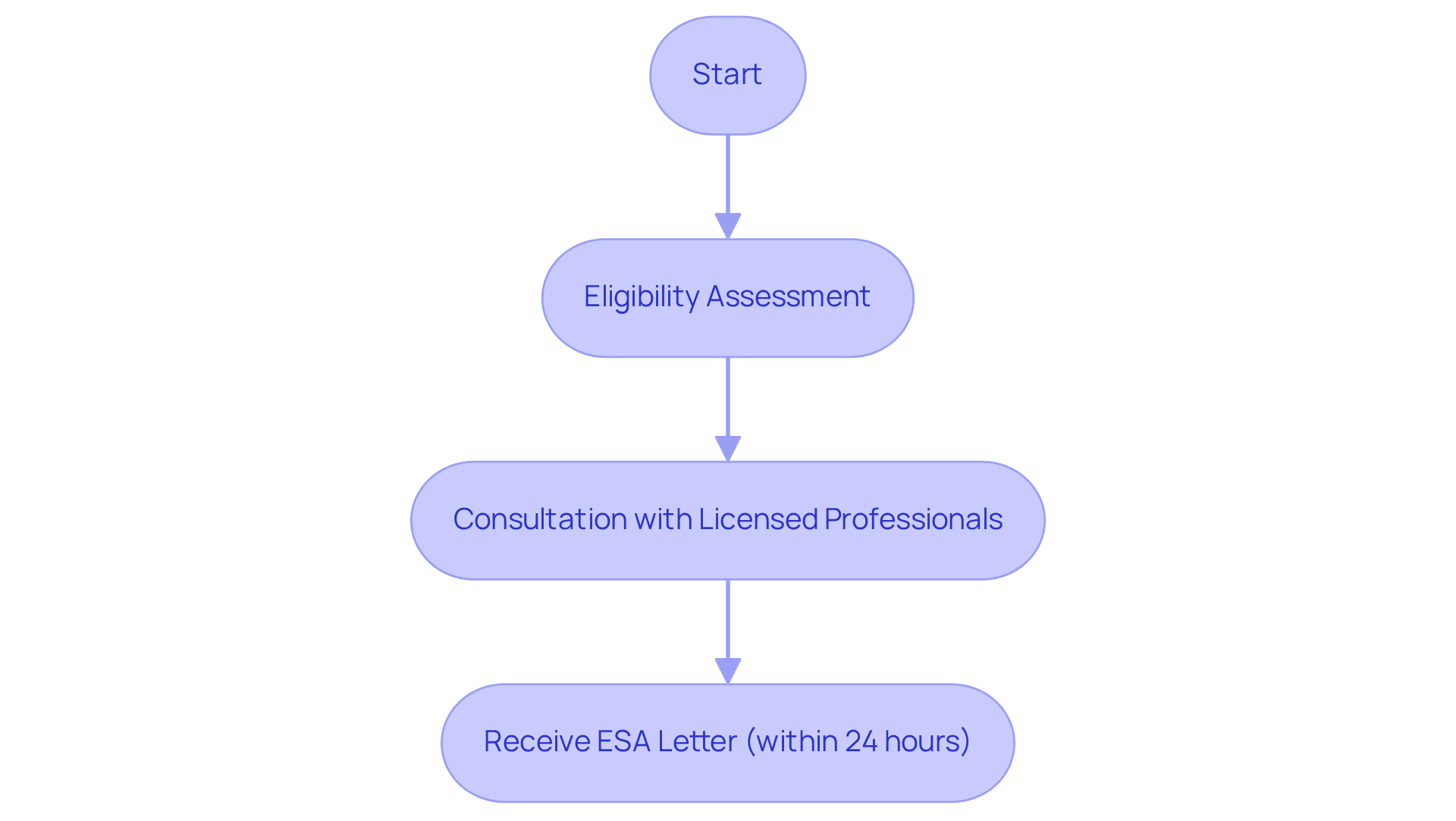
Fair Housing Act: Key Protections for Emotional Support Animals
The Fair Housing Act (FHA) provides essential protections for individuals with Emotional Support Animals (ESAs), ensuring that housing providers accommodate tenants who need these animals. For those in Georgia, emotional support animal laws Georgia permit you to live with your ESA in pet-restricted housing without facing discrimination. The FHA broadly applies to various housing situations, including apartments and rental homes, allowing individuals with mental health challenges to access the emotional support they truly need.
Unfortunately, housing discrimination cases related to emotional support animal laws Georgia are increasing in the state, highlighting the ongoing struggles renters face. It’s crucial to understand that under the FHA, landlords are not allowed to impose pet fees or deposits for ESAs; they must provide reasonable accommodations instead. There are many successful examples of ESA accommodations, such as tenants being permitted to keep their animals despite previous no-pet policies. These instances underscore the importance of knowing your rights under this law.
Additionally, the FHA requires tenants to provide documentation from a qualified healthcare provider to substantiate their need for an ESA due to a disability. This step can be vital in navigating housing situations. As awareness of these rights increases, it’s important for residents to stay informed about the protections available to them under the FHA, ensuring they can advocate effectively for their needs. Remember, you are not alone in this journey, and support is available.
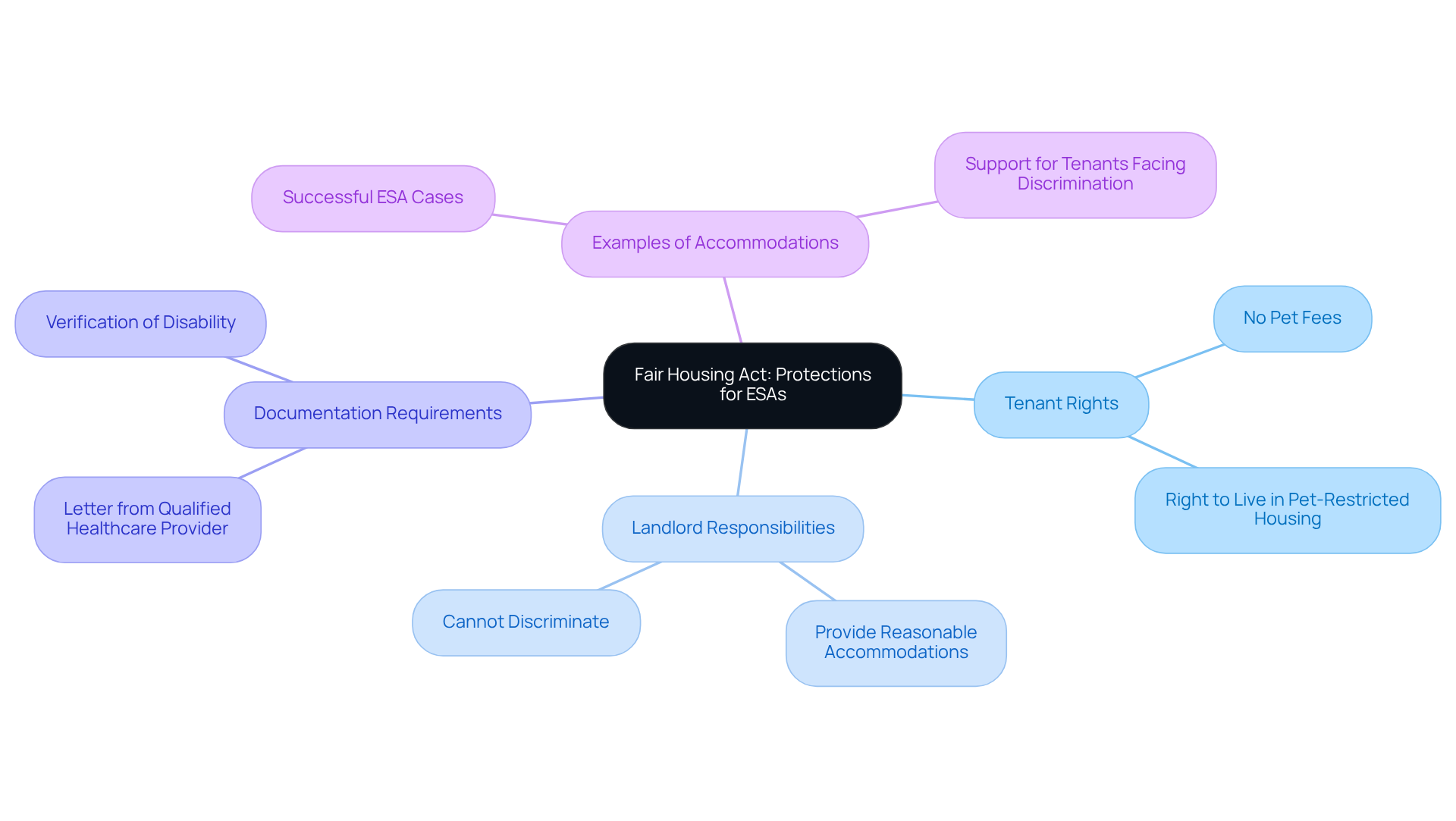
Georgia State Laws: Understanding Local ESA Regulations
Navigating the emotional support animal laws in Georgia can be a daunting experience for many individuals dealing with mental health challenges. While the state’s regulations enhance federal protections, particularly those outlined in the Fair Housing Act, it is essential for residents to be aware of local ordinances that may further influence ESA regulations. For example, according to emotional support animal laws Georgia, landlords cannot deny an ESA based solely on breed, size, or weight, as long as the animal does not pose a threat or cause significant property damage. This understanding can alleviate some of the stress ESA owners face, knowing that they have rights in these situations.
Furthermore, it is important to note that landlords cannot charge deposits or additional fees for ESAs under the Fair Housing Act, which is a significant right for ESA owners. If a landlord denies reasonable accommodations, individuals have the option to file a complaint with the U.S. Department of Housing and Urban Development (HUD), ensuring they have recourse options available. This knowledge can empower ESA owners, providing them with a sense of security in their housing situations.
Familiarizing oneself with local ordinances is crucial, as emotional support animal laws Georgia can dictate how ESAs are treated in various housing scenarios. While the Fair Housing Act mandates reasonable accommodations, emotional support animal laws Georgia might require additional stipulations, such as documentation from a licensed mental health professional or adherence to local vaccination and licensing requirements. Understanding these nuances can help ESA owners navigate their rights effectively, fostering a sense of agency and confidence.
Legal specialists emphasize that possessing a valid ESA document is vital for obtaining housing accommodations. This document serves as proof of the individual’s need for an ESA, ensuring that landlords cannot impose extra pet fees or deny housing based on no-pet policies. For ESA owners to fully exercise their rights and responsibilities, it is essential to remain aware of emotional support animal laws in Georgia as well as local regulations. As legal expert Robert Clendenin, MD, wisely notes, “Your ESA must not pose a direct threat to others or cause significant property damage,” underscoring the importance of responsible ownership. By understanding and advocating for their rights, individuals can create a supportive environment for themselves and their beloved ESAs.
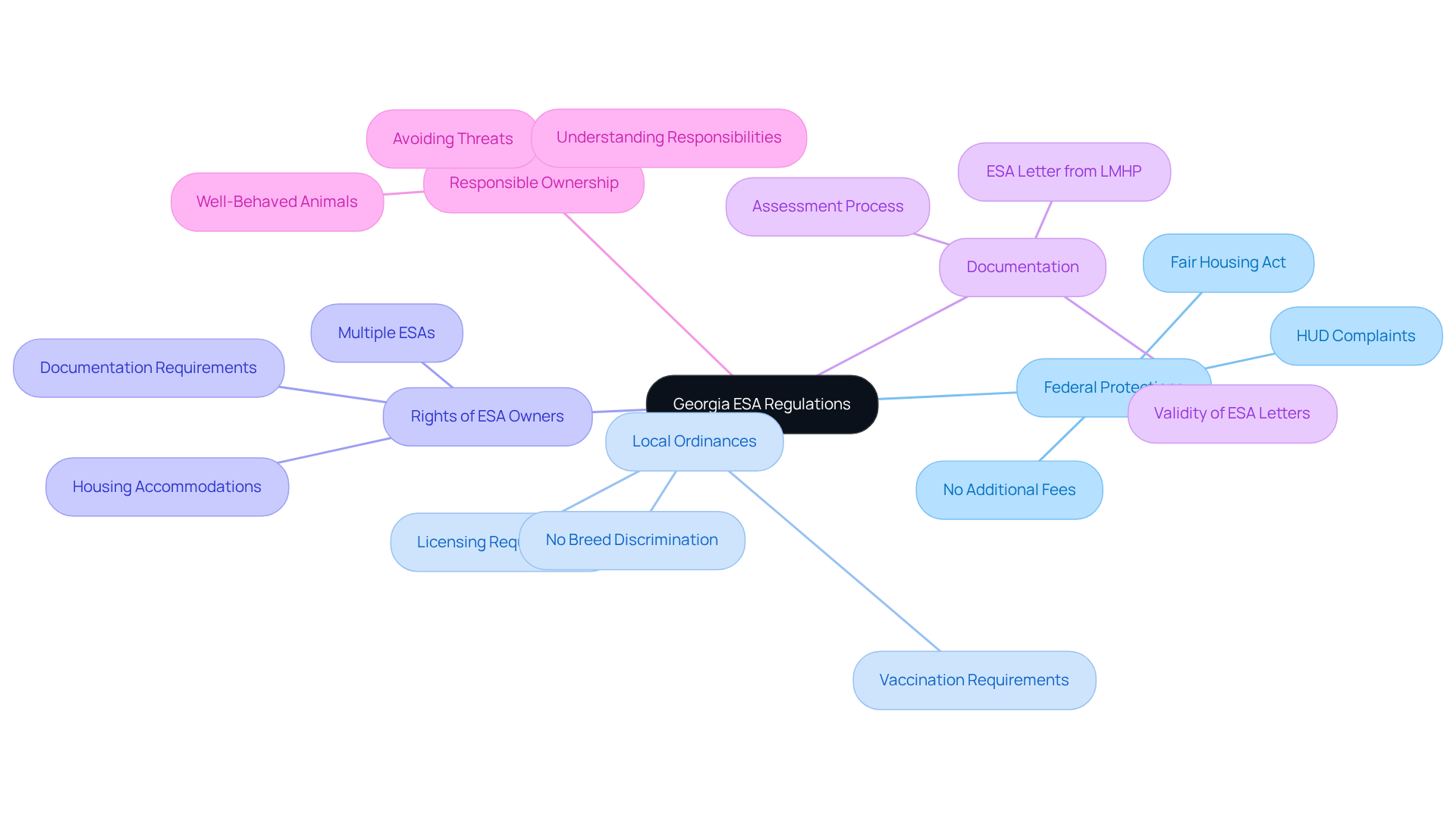
Required Documentation: What You Need for ESA Compliance in Georgia
Navigating mental health challenges can be incredibly difficult, and for many individuals, the support of an emotional support animal (ESA) can make a significant difference. To comply with emotional support animal laws in Georgia, it is essential to provide specific documentation, primarily a valid ESA letter issued by a licensed mental wellness professional (LMWP). This letter must clearly express the necessity for an emotional support animal, affirming that the individual’s mental condition substantially impacts their daily life.
To qualify for an ESA letter, individuals must have a diagnosed mental health condition recognized in the DSM-5. The letter should include the following:
- The date of evaluation
- The professional’s signature
- Their contact information
- Details about their license type, number, and state of issuance
Additionally, it is vital that the document adheres to the Fair Housing Act (FHA) requirements and emotional support animal laws in Georgia, ensuring acceptance by landlords and housing authorities. This documentation is crucial for securing rights related to housing accommodations, especially in environments where pets are restricted.
It’s important for residents to keep their ESA letters up to date, as these typically require yearly renewal to maintain legal protections. Mental wellness specialists emphasize that a well-documented ESA letter is vital for individuals facing housing challenges, ensuring they receive the necessary support in accordance with emotional support animal laws in Georgia. By proactively communicating with landlords and promptly providing the required documentation, residents can better navigate their housing situations with confidence and care.
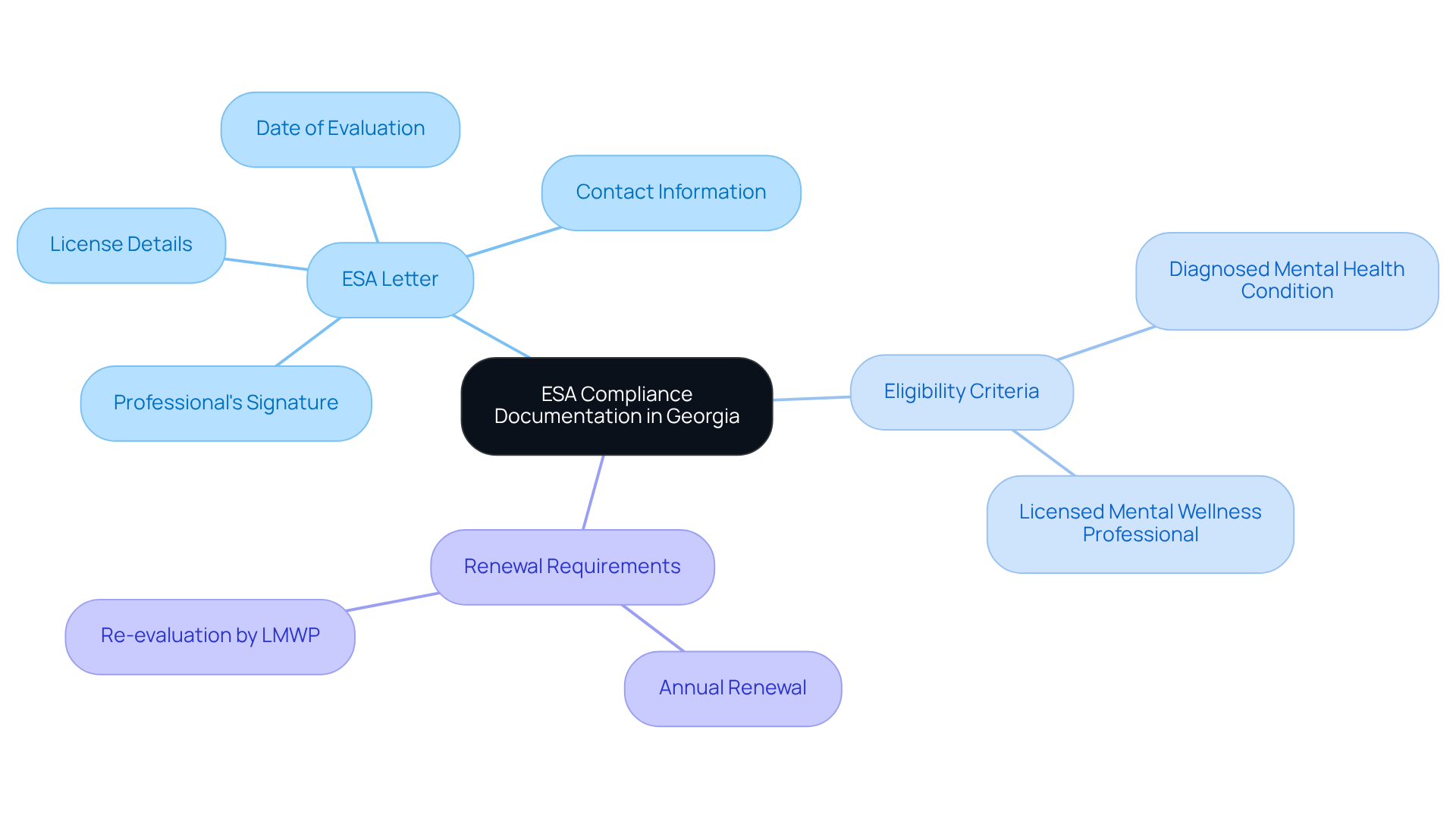
Landlord Rights: Navigating ESA Requests in Georgia
Navigating the world of Emotional Support Animals (ESAs) can be challenging for many individuals facing mental health issues. It’s important to recognize the emotional weight of these struggles and the vital role that ESAs can play in providing comfort and support. In this context, landlords possess specific rights under emotional support animal laws in Georgia, including the ability to request documentation to substantiate the need for an ESA. Typically, this documentation includes a valid ESA letter from a licensed mental care provider, which serves as a compassionate solution for those in need.
Landlords may also inquire about the animal’s behavior and training to ensure that they are compatible with their property. However, it’s crucial to understand that under the Fair Housing Act, emotional support animal laws in Georgia state that landlords cannot impose pet fees or deposits for ESAs, as these animals are not classified as pets. This distinction is especially important for ESA owners, who should approach conversations with landlords equipped with the necessary documentation and a clear understanding of their rights under emotional support animal laws in Georgia. Open communication can pave the way for successful negotiations, allowing tenants to advocate effectively for their emotional support needs while ensuring compliance with legal requirements.
Moreover, it’s essential to be aware that landlords could face fines up to $75,000 for illegally refusing an ESA, highlighting the significance of complying with emotional support animal laws in Georgia. If landlords enforce breed restriction policies, they must provide valid proof of risk. As HUD states, ESA owners should adhere to emotional support animal laws in Georgia as well as the FHA and local housing rules when requesting accommodations. To prepare for discussions with landlords, ESA owners should gather all relevant documentation and familiarize themselves with their rights under the Fair Housing Act, ensuring they feel supported and empowered throughout the process.
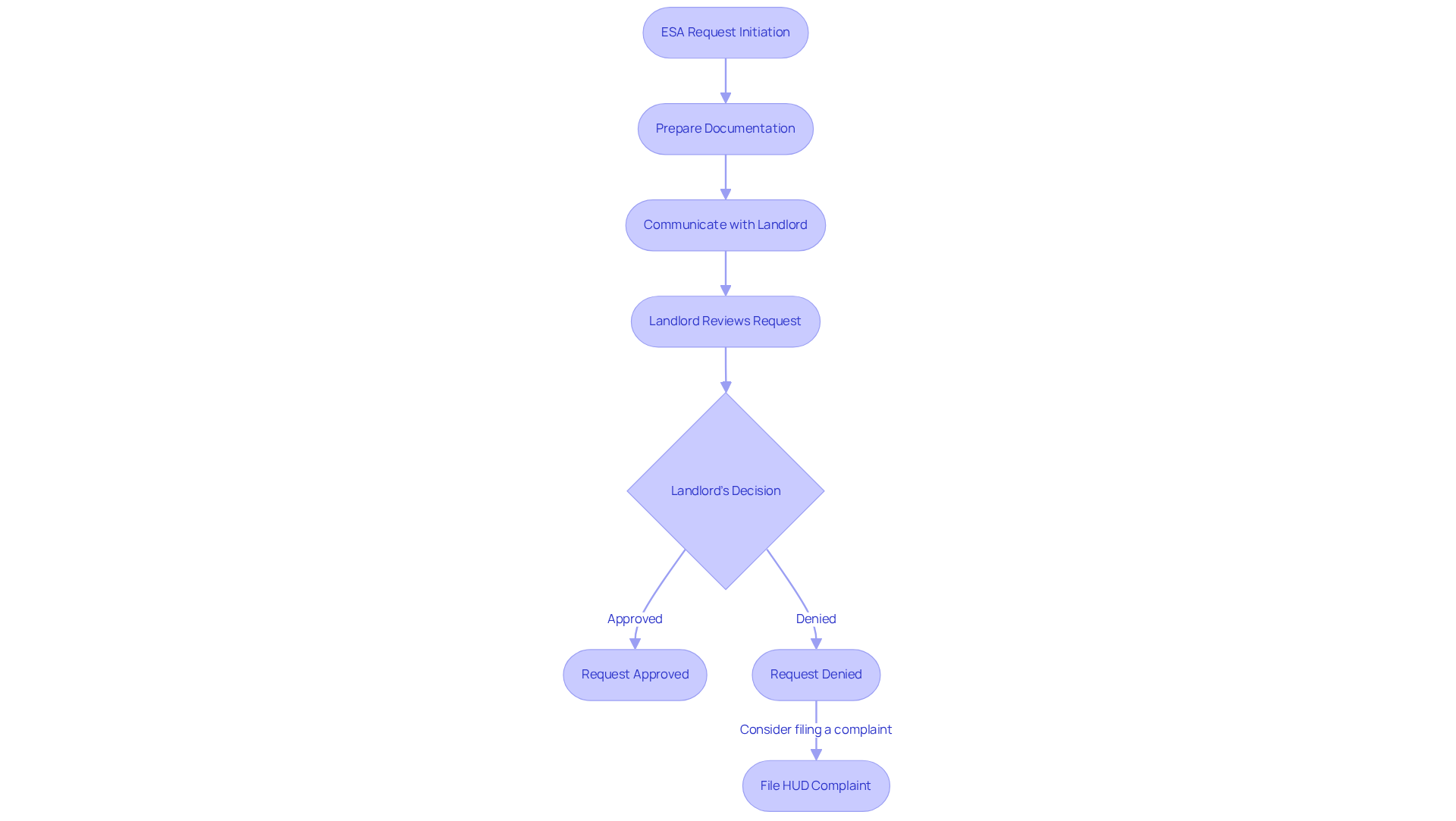
Limitations of ESA Laws: When Requests Can Be Denied
While the Fair Housing Act offers essential protections for Emotional Support Animal (ESA) owners, it’s important for residents to be aware of the emotional support animal laws in Georgia and their limitations. Many individuals face emotional challenges when seeking ESAs, and the process can feel overwhelming. Requests for ESAs may be denied under specific circumstances:
- If the animal poses a direct threat to the health or safety of others
- If it causes significant property damage
- If the individual does not have a legitimate need for an ESA, as assessed by a licensed mental health professional
This can be disheartening, especially when you are seeking comfort and support.
Notably, FHA complaints regarding disability access and the denial of reasonable accommodations make up 60% of all FHA complaints against housing providers. This statistic highlights the prevalence of such denials and the emotional toll they can take on individuals in need. However, it’s reassuring to know that landlords cannot impose extra charges for emotional support animals, reinforcing the rights of ESA owners in the state. Understanding these limitations is crucial for effectively advocating for your rights while remaining realistic about the challenges that may arise in securing accommodations under emotional support animal laws in Georgia.
As you navigate this journey, remember that having a legitimate ESA letter is vital to support your accommodation requests. As HUD states, “A disability is a physical or mental impairment that substantially limits one or more major life activities.” This underscores the importance of having proper documentation to advocate for your needs. You are not alone in this process, and there are supportive resources available to help you through these challenges.
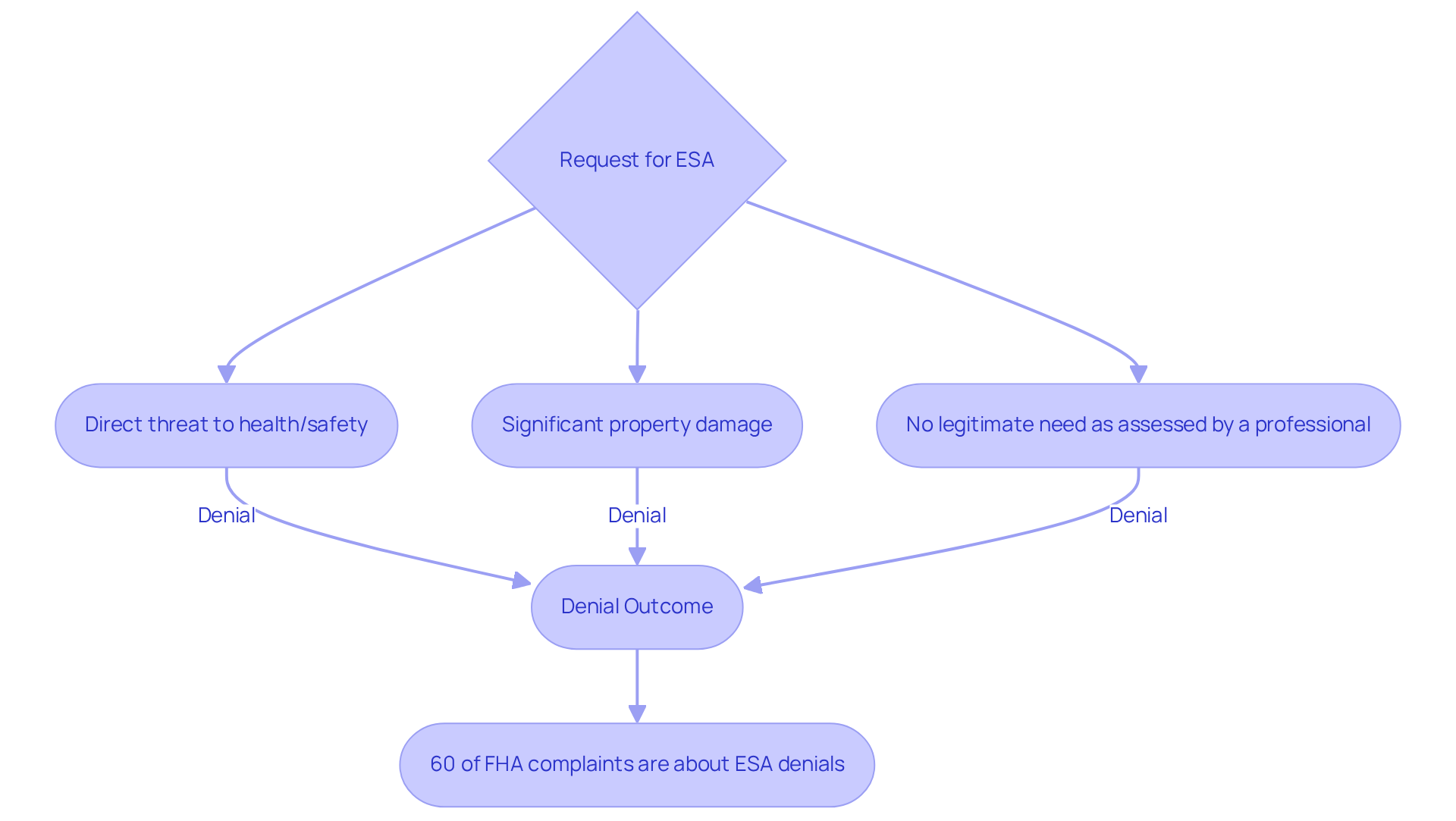
ADA Implications: How It Affects ESAs in Georgia
The Americans with Disabilities Act (ADA) does not recognize Emotional Support Animals as service animals, which can be a source of confusion and frustration for many. Under the ADA, only dogs (and in some cases, miniature horses) that are trained to perform specific tasks for individuals with disabilities are considered service animals. This distinction is crucial for residents to grasp, as it means that ESAs do not enjoy the same access rights in public places as service animals do.
Yet, it’s important to remember that ESAs are still protected under the Fair Housing Act. This means they can reside with their owners in housing situations that might otherwise restrict pets. Understanding these nuances can help alleviate some of the stress surrounding the emotional support animal laws in Georgia, providing a sense of clarity and support.
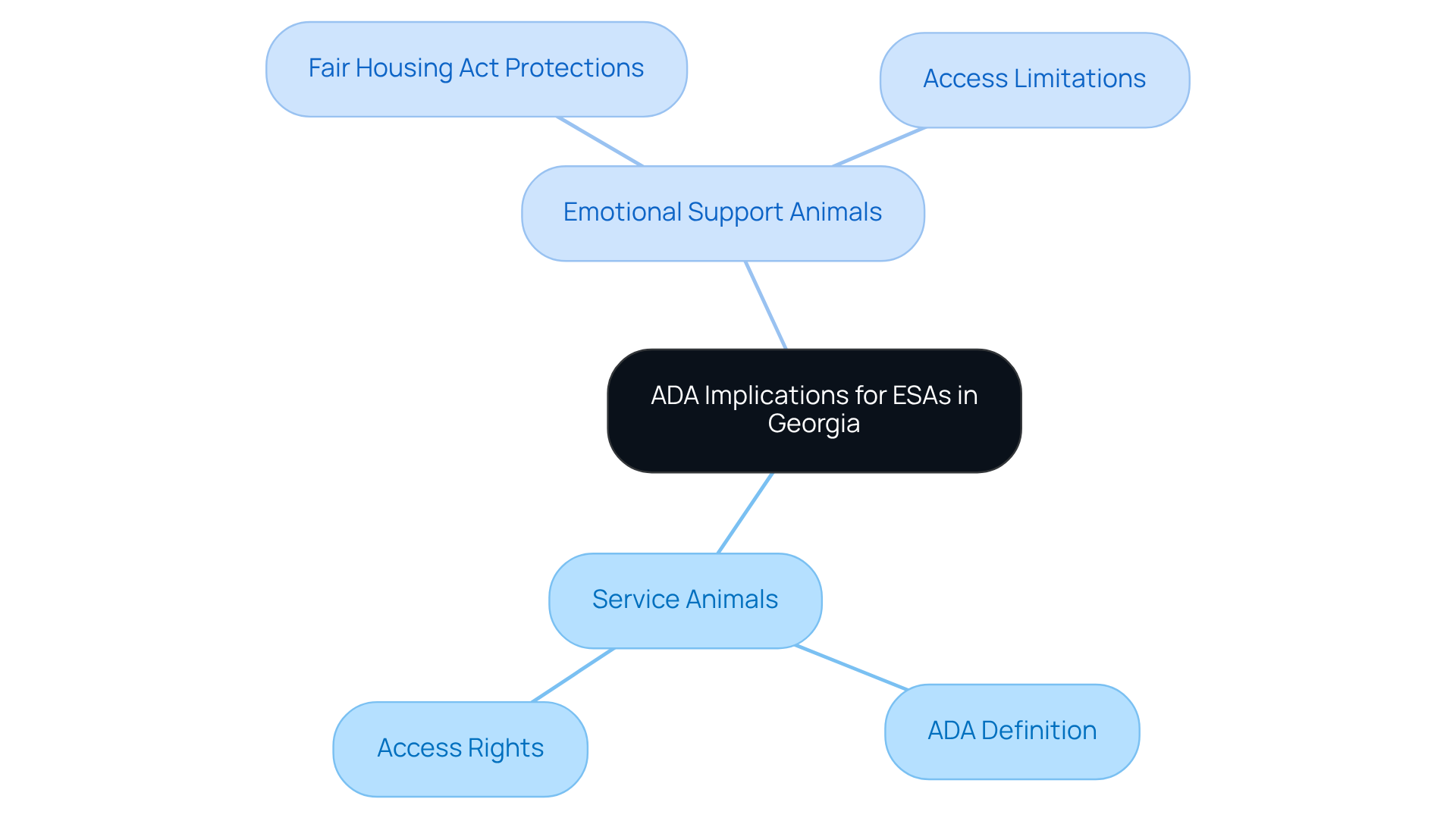
Travel Regulations: Bringing Your ESA on Flights from Georgia
Traveling with an emotional support animal can be a daunting experience from Georgia, particularly when considering the emotional support animal laws Georgia and the specific regulations set by airlines. Recent changes in the Air Carrier Access Act (ACAA) in 2021 mean that many airlines no longer recognize ESAs as service animals. This shift can leave travelers feeling uncertain and anxious, as ESAs are now treated similarly to typical pets. To ensure a smooth journey, it is essential to have a valid ESA document issued by a licensed mental health professional. This letter may need to be accompanied by additional paperwork, such as a veterinary wellness form.
Moreover, airlines often impose fees and have restrictions regarding the size and breed of the animal. It’s crucial for travelers to verify their airline’s policies well in advance of their journey. For instance, many airlines require at least 48 hours’ notice for traveling with an ESA, and some limit each passenger to one ESA. Staying informed about these evolving regulations is vital for a positive travel experience.
Airline representatives have made it clear that they reserve the right to refuse boarding if an ESA exhibits disruptive behavior or does not meet medical standards. As one representative noted, “Airlines have the right to restrict your emotional support animal if it displays disruptive behavior.” This reinforces the importance of preparing adequately and understanding the requirements, as doing so can greatly enhance the travel experience for both the owner and their emotional support animal in accordance with emotional support animal laws Georgia.
If you’re feeling overwhelmed by these regulations, remember that you are not alone. Many individuals face similar challenges, and the support of an ESA can provide comfort and reassurance during such stressful times. By taking the necessary steps to understand and comply with airline policies, you can embark on your journey with confidence, knowing that your emotional support animal is there to help you along the way.
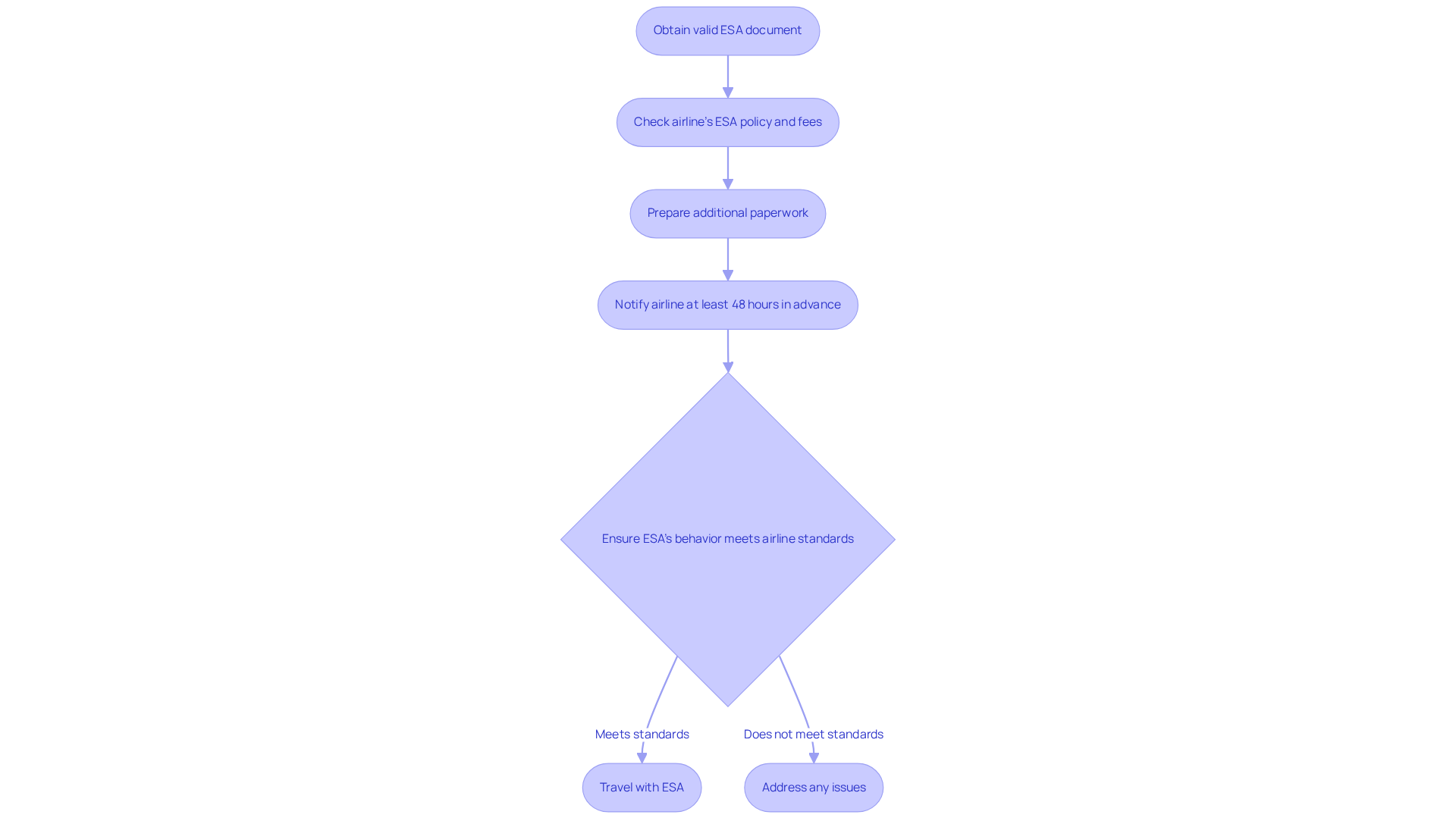
Pet Insurance: Financial Protection for ESA Owners in Georgia
For many Emotional Support Animal (ESA) owners, navigating the complexities of care can be overwhelming, especially when unexpected veterinary expenses arise. Pet insurance can serve as a valuable resource, providing financial protection that eases the burden during trying times. Imagine the relief of knowing that your beloved companion’s routine care, accidents, and illnesses are covered, allowing you to focus on the joy they bring to your life.
It’s essential for owners to take the time to research various insurance options, seeking a plan that aligns with their unique needs and budget. This thoughtful approach ensures that your emotional support companion receives the best possible care, reinforcing the bond you share. Remember, you are not alone in this journey; support is available to help you navigate these important decisions.
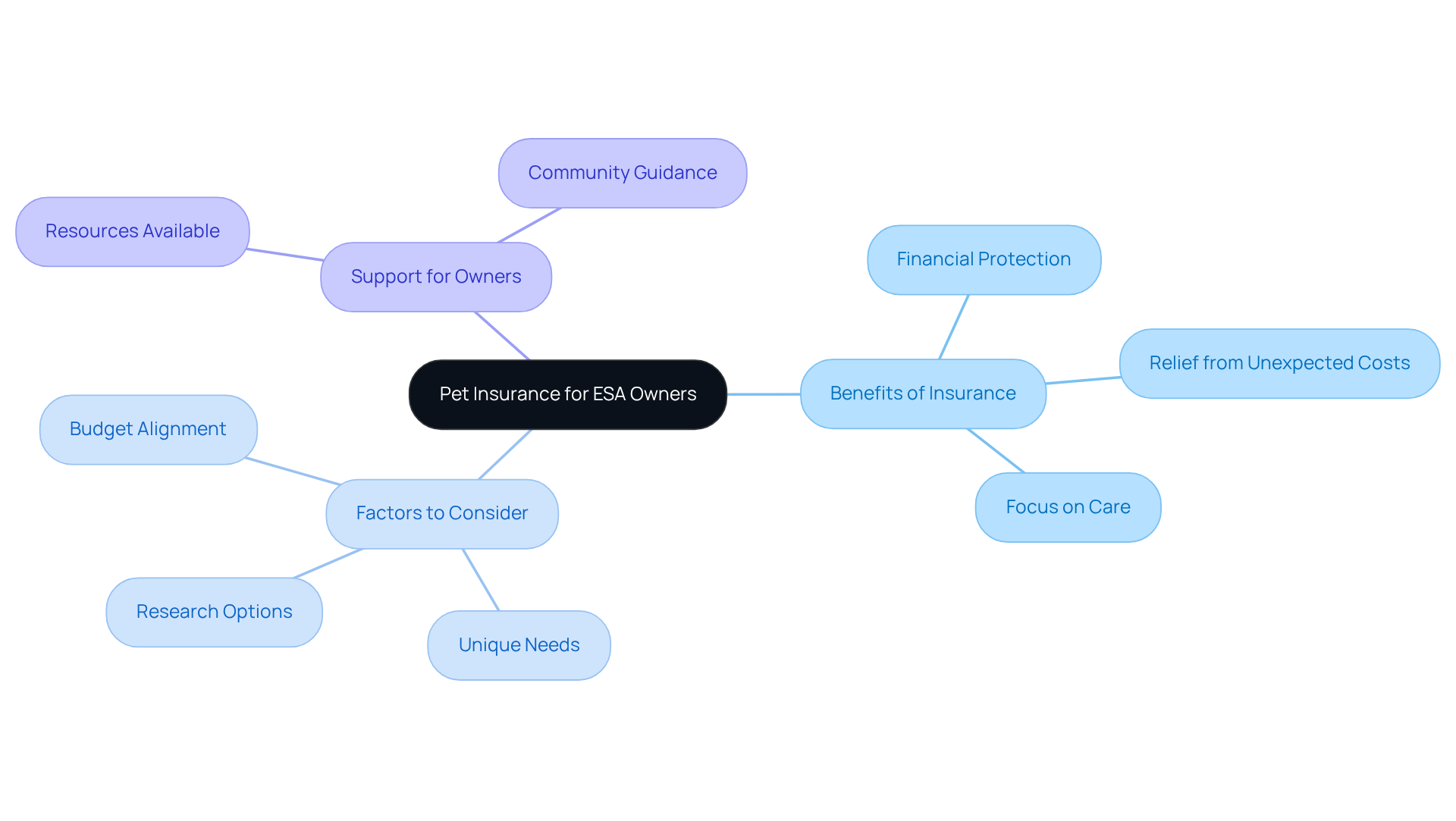
Requesting an ESA Letter: Steps for Georgia Residents
For Georgia residents seeking an Emotional Support Animal (ESA) document, understanding emotional support animal laws Georgia can help ease the overwhelming journey, especially when addressing mental wellness needs like anxiety or depression. It’s essential to first evaluate your eligibility by reflecting on these emotional challenges. Next, consider choosing a licensed mental wellness expert who understands the profound benefits that ESAs can provide. Scheduling a consultation allows you to discuss your specific needs and helps you obtain the necessary documentation tailored to your situation.
As you move forward, ensure that your ESA document is properly formatted, including all vital information such as the professional’s details and a statement of your mental health condition. Presenting this document to your landlord or housing provider is a crucial step in securing your rights under the emotional support animal laws Georgia and the Fair Housing Act. By following these steps, you can simplify the process and enhance your chances of receiving the support you truly deserve.
Wellness Wag offers ESA documentation within 24 hours of approval, with flexible payment options starting at just $32.25, making this essential support more accessible to you. Remember, open communication with your mental wellness provider about your needs is vital, as they can guide you through potential challenges in obtaining your ESA letter. As Dr. Ernesto Lira de la Rosa, a licensed clinical psychologist, wisely notes, ‘If you’re interested in getting an emotional support animal, start by contacting a licensed mental health professional.’ Your journey towards emotional support begins with understanding and seeking the help you need.
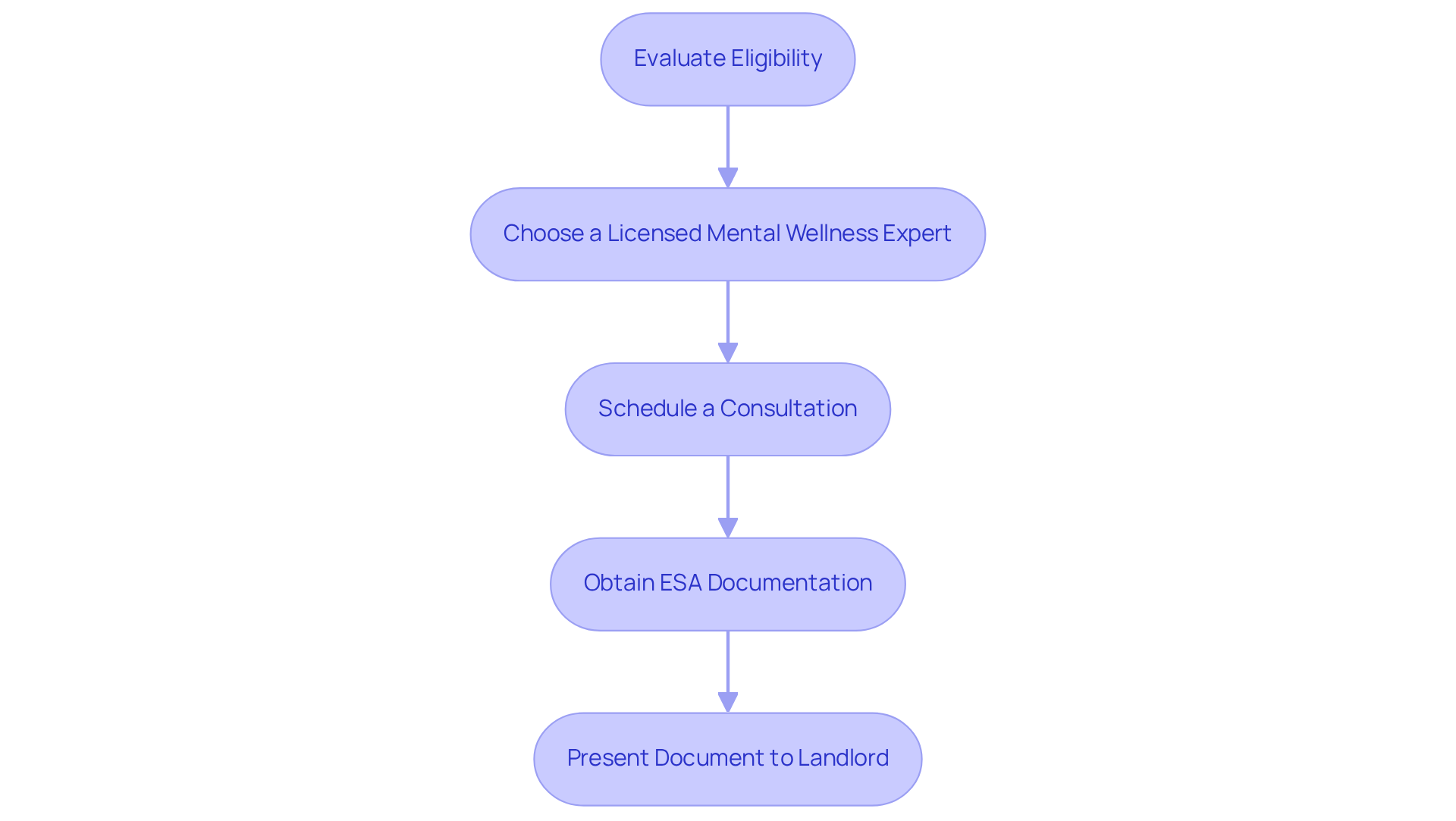
Conclusion
Understanding the emotional support animal laws in Georgia is crucial for residents who wish to navigate their rights and responsibilities effectively. These laws offer essential protections that empower individuals facing mental health challenges to live more comfortably alongside their emotional support animals. By recognizing the significance of the Fair Housing Act and local regulations, residents can advocate for their needs and ensure they receive the support they truly deserve.
The article highlights key aspects of ESA laws, including:
- The necessary documentation for compliance
- The rights of tenants in housing situations
- The potential limitations that may arise during the process
It underscores the importance of having a valid ESA letter and being aware of landlord responsibilities, along with the evolving landscape of travel regulations affecting ESAs. Each of these points reinforces the notion that informed individuals are better equipped to navigate the complexities of emotional support animal ownership.
As the journey toward securing an emotional support animal unfolds, it is vital for Georgia residents to remain proactive and informed. Engaging with licensed mental health professionals, understanding housing rights, and staying updated on travel regulations can empower individuals to cultivate a supportive environment for themselves and their ESAs. Embracing these resources and knowledge not only enhances personal well-being but also nurtures a community that values the emotional support provided by these cherished animals.
Frequently Asked Questions
What services does Wellness Wag provide for Georgia residents?
Wellness Wag offers quick and effective services to help Georgia residents acquire their Emotional Support Animal (ESA) documents through a brief eligibility assessment and a consultation with licensed medical professionals, with official ESA letters provided within 24 hours.
How does Wellness Wag support individuals in need of ESAs?
Wellness Wag provides compassionate assistance to individuals facing emotional challenges and offers a money-back guarantee to ensure client satisfaction.
What protections does the Fair Housing Act (FHA) offer for individuals with ESAs?
The FHA provides protections for individuals with Emotional Support Animals, allowing them to live with their ESAs in pet-restricted housing without discrimination and prohibiting landlords from imposing pet fees or deposits.
What are the rights of ESA owners under Georgia’s emotional support animal laws?
Under Georgia’s emotional support animal laws, landlords cannot deny an ESA based on breed, size, or weight, and they cannot charge deposits or additional fees for ESAs.
What documentation is required to support the need for an ESA in housing situations?
Tenants must provide documentation from a qualified healthcare provider to substantiate their need for an ESA due to a disability, as required by the Fair Housing Act.
What should ESA owners do if their landlord denies reasonable accommodations?
If a landlord denies reasonable accommodations for an ESA, individuals can file a complaint with the U.S. Department of Housing and Urban Development (HUD) for recourse.
Why is it important for ESA owners to understand local ordinances regarding ESAs?
Understanding local ordinances is crucial as they may impose additional stipulations on how ESAs are treated, including documentation requirements and local vaccination and licensing rules.
What is the significance of having a valid ESA document for housing accommodations?
A valid ESA document serves as proof of an individual’s need for an ESA, ensuring that landlords cannot impose extra pet fees or deny housing based on no-pet policies.
Certify Your Emotional Support Animal Today

Why You Can Rely on Us?
At Wellness Wag, we believe your pet deserves care rooted in both science and compassion. Each article is carefully researched, written in clear language for pet owners, and then reviewed by qualified professionals to ensure the information is evidence-based, current, and practical for real-life care. Our goal is to help you feel confident in making informed decisions about your pet’s health and well-being.
Reviewed by
Angela Morris, MSW, LCSW
Angela is a licensed clinical social worker with 20 years of experience in patient advocacy and community mental health. She has assisted numerous clients with ESA evaluations and brings a deep understanding of disability accommodations, ensuring that all information is accurate, supportive, and practical.

Written by :
Lena Park
Last Updated :
July 24, 2025












